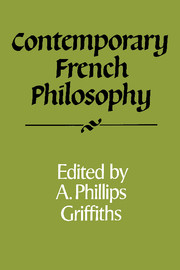Book contents
- Frontmatter
- Contents
- Preface
- Continental Insularity: Contemporary French Analytical Philosophy
- The Misprision of Pragmatics: Conceptions of Language in Contemporary French Philosophy
- Ants and Women, or Philosophy without Borders
- Motifs towards a Poetics
- The Relevance of Cartesianism
- The Enlightenment without the Critique: A Word on Michel Serres' Philosophy
- The Teleological and Deontological Structures of Action: Aristotle and/or Kant?
- The Crisis of the Post-modern Image
- Merleau-Ponty and the Phenomenology of Perception
- Epistemological History: The Legacy of Bachelard and Canguilhem
- History as Genealogy: An Exploration of Foucault's Approach to History
- Beyond Deconstruction?
- Further Adventures of the Dialectic: Merleau-Ponty, Sartre, Althusser
- Paradoxes of the Pineal: From Descartes to Georges Bataille
- Notes on Contributors
- Index
Ants and Women, or Philosophy without Borders
Published online by Cambridge University Press: 25 May 2010
- Frontmatter
- Contents
- Preface
- Continental Insularity: Contemporary French Analytical Philosophy
- The Misprision of Pragmatics: Conceptions of Language in Contemporary French Philosophy
- Ants and Women, or Philosophy without Borders
- Motifs towards a Poetics
- The Relevance of Cartesianism
- The Enlightenment without the Critique: A Word on Michel Serres' Philosophy
- The Teleological and Deontological Structures of Action: Aristotle and/or Kant?
- The Crisis of the Post-modern Image
- Merleau-Ponty and the Phenomenology of Perception
- Epistemological History: The Legacy of Bachelard and Canguilhem
- History as Genealogy: An Exploration of Foucault's Approach to History
- Beyond Deconstruction?
- Further Adventures of the Dialectic: Merleau-Ponty, Sartre, Althusser
- Paradoxes of the Pineal: From Descartes to Georges Bataille
- Notes on Contributors
- Index
Summary
Some months ago, when giving a paper about Sir Francis Bacon's philosophy, I mentioned that, according to him, Nature was a woman; true knowledge treats her like his legitimate wife, while false knowledge deals with her as if she were a barren prostitute. In the same paper, I also mentioned that according again to Bacon, there are three kinds of intellectual attitudes, or three kinds of philosophers, namely the pure rationalists, who are like spiders, the empiricists who are like ants, for they gather materials but do not work on them, and a third category—good philosophers who are like bees, for they gather and work on the material gathered. Now, during the discussion a gentleman strongly objected to Bacon's use of ants as a metaphor. He explained that there are many different species of ants, and some of them do not merely gather, some have gardens for instance, where they grow mushrooms. The gentleman concluded that philosophers do not know what they are talking about when they use metaphors. This is true enough, but I felt sorry indeed that nobody observed that it is not true that a woman is either a wife or a prostitute; nobody asked whether ‘nature as her’ implied that the scientist is, as a matter of course, male; nobody said that the simple fact of using ‘woman’ as a metaphor is questionable in itself.
- Type
- Chapter
- Information
- Contemporary French Philosophy , pp. 41 - 54Publisher: Cambridge University PressPrint publication year: 1989



